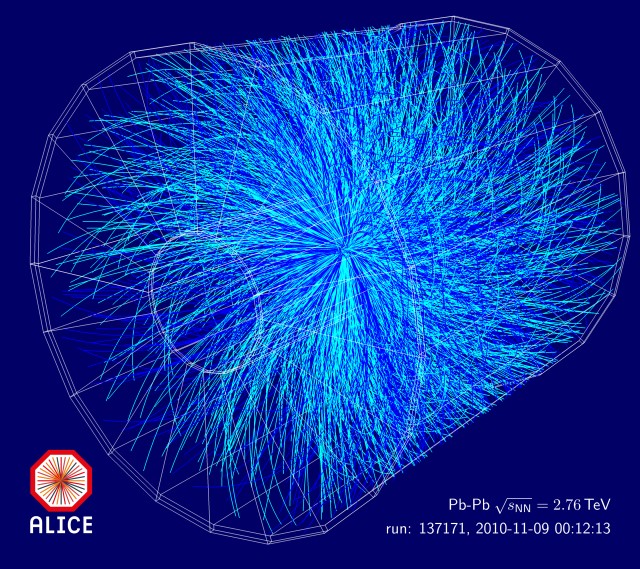
70 years of CERN and NPI
03. 10. 2024

On October 1, 2024, the European Organization for Nuclear Research – CERN celebrated its 70th anniversary. The celebrations took place in the CERN Science Gateway, the new hub for education and outreach, and they were attended by many national delegations including scientific, political, and economic leaders. Among the scientists who work in the experiments hosted by CERN, there is also a team from the NPI. One of the team members is Dr. Filip Křížek, head of the Department of Heavy Ion Physics at the NPI. He described the current cooperation and plans for the future in an interview.
● What does the CERN's anniversary mean for the NPI and what does it mean for you as a scientist who regularly visits CERN and participates in research?
Over the 70 years of its existence, CERN has become the world's leading laboratory in the field of particle physics and related technologies. The participation of Czech institutions in this organization enables our scientists and students to actively participate in cutting-edge science and contribute to the development of technology.
● What projects is the NPI team involved in?
Scientists from the NPI are involved in two experiments at CERN. The first one is the ALICE experiment, which investigates quark-gluon plasma produced in collisions of ultra-relativistic nuclei. Quark-gluon plasma is a form of matter, which was present in the early universe about 1 microsecond after the Big Bang. This experiment therefore helps us to understand the properties of this extreme state of matter and in addition, is a source of other unique data, for example, on properties of antimatter nuclei and their interactions with matter, on interactions between various types of hadrons, etc. In addition to the analysis of physical data, the team from the NPI also participates in the R&D of silicon detectors for the future ALICE experiment upgrade. For instance, the proton beam from the U-120M cyclotron at NPI is used to test the radiation hardness of sensor prototypes.
Our second activity is participation in smaller-scale experiments on the mass isotope separator ISOLDE. This facility can prepare beams of rare isotopes of various nuclei including those with a very short lifetime. One of the experiments with our participation is called WISArD. It provides precise measurements of the beta decay of the isotope argon 32 and searches for possible deviations w.r.t. the theoretical description expected from the Standard Model of particles and interactions.
● What would you wish CERN on its 70th anniversary? What are the plans of the team from the NPI?
CERN should maintain its exceptional position among the world's high-energy physics laboratories. To achieve that CERN works on a high-luminosity upgrade of the LHC, which will increase the beam intensity. The upgraded LHC will then run from 2035 to 2041. Within this phase, we would like to participate in the proposed ALICE 3 experiment, which is considered to replace the existing ALICE experiment. The detector of the ALICE 3 experiment will advance the technical possibilities of current silicon detectors. Beyond 2041, CERN intends to build a new accelerator called Future Circular Collider, which would further increase the energy of the colliding particles. This machine will be placed in a 100 km-long tunnel. Hence, in the years to come, I would like to wish CERN that it further pushes the boundaries of modern technologies and our knowledge and that it finds sufficient financial resources to work on these challenges.
Who represented the Czech Republic at the ceremony?
On behalf of the Czech Republic, the ceremony was attended by a delegation headed by His Excellency PhDr. Marek Ženíšek, Ph.D., Minister of Science, Research and Innovation. Other members of the delegation were H.E. Ing. Václav Bálek, Permanent Representative of the Czech Republic to the UN and other organizations in Geneva, Mgr. Jana Havlíková, Deputy Minister for Science, Research and Innovation, PhDr. Pavel Doleček, Ph.D., Deputy Minister for Science, Research and Innovation, Mgr. Dana Bilíková, Director General for Science, Research and Innovation, Prof. PaedDr. Radka Wildová, CSc., Director General for Higher Education, Science and Research section, Ministry of Education, Youth and Sports, Prof. RNDr. Rupert Leitner, DrSc., CERN Council delegate, Ing. Ondřej Novák, CERN Council adviser, and Mgr. Kristýna Lexa Sedláková, CERN Council adviser.
Photo: CERN
Read also
- Neutrino is lighter than previously thought. NPI contributed to the record measurement
- NPI involved in research on advanced battery technologies
- Dr. Andrej Kugler Presented the Current Status of the FAIR-CZ Project
- We Joined the First Annual Radioactive Day
- Milan Štefánik is the new head of the Department of Accelerators
- Within the framework of EU projects, the NPI offers the use of instrument time on its facilities
- NPI to organise ReMade workshop in Prague in May 2025
- The Scientific Advisory Board of the FAIR-CZ project met for the tenth time
- Iva Synková from DNIM received the Martina Roeselová Memorial Fellowship
- Prof. Ondřej Lebeda gave a lecture at FEE CTU

